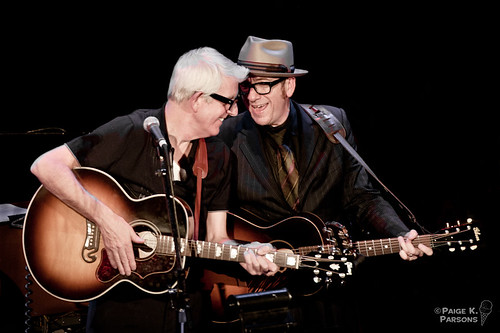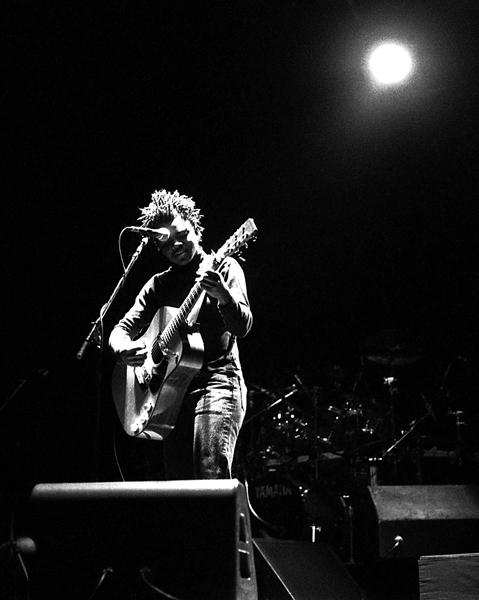[under construction]
Anthems for a New Generation
A songbook of progressive/protest music for the twenty-first century. Dozens of anthems from 1970 to the present, from around the world, all with an essential "hook" that makes them ideal for progressive mobilizations and celebrations.
Wednesday, August 29, 2012
Sunday, August 26, 2012
"Wind of Change" - Scorpions
It's a funny thing, the iconic reach of this song. Written by Scorpions vocalist Klaus Meine, it's one of the premier power ballads of all time -- one of the few globally successful ones sung by a continental European band. You're as likely to hear its whistled opening refrain in Argentina as in Uzbekistan, in St. Petersburg as in Johannesburg.
"Wind of Change" is remembered as the theme song of arguably the last great political-cultural moment in world politics -- the collapse of communism in Central Europe and the former USSR in 1989-90. It was indeed inspired by those events: Scorpions played in Moscow in 1989, at the height of Mikhail Gorbachev's campaign of glasnost (openness). But the song wasn't released until November 1990, and didn't become an international hit until well into 1991. It went on to be voted "Song of the Century" in a German ZDF network poll. As I say, you hear it damn near everywhere.
Adorable and just a little kitsch, "Wind of Change" draws its central motif not from Central Europe, but from Africa. The British Prime Minister Harold Macmillan, addressing a recalcitrantly racist parliament in South Africa in February 1960, declared that a "wind of change" was sweeping the African continent -- one of national liberation and political independence. (His speech ever since has been remembered as the "Winds of Change" speech, but it was WIND, and Scorpions got it right.)
The direct references in "Wind of Change", however, are not to Africa but to post-Soviet Russia -- as the video (below) also makes clear. The Moskva river and Gorky Park are mentioned at the outset, establishing an ambience of intoxicated emancipation that carries through the anthemic and only slightly cringe-inducing chorus ("the magic of the moment / On a glory night ..."):
Follow the Moskwa
Down to Gorky Park
Listening to the wind of change
An August summer night
Soldiers passing by
Listening to the wind of change
The world is closing in
Did you ever think
That we could be so close, like brothers
The future's in the air
Can feel it everywhere
Blowing with the wind of change
Take me to the magic of the moment
On a glory night
Where the children of tomorrow dream away
In the wind of change ...
Saturday, August 25, 2012
"Wavin' Flag" - K'naan
I made a point of being in Africa during the entire 2010 World Cup -- mostly in Ghana, whose team was the only African one that ended up doing much in the tournament, advancing to within a struck crossbar of the semi-finals. The official song for the 2010 tournament was Shakira's "Waka Waka: This Time for Africa", which was promoted at every opportunity.
It was striking to observe, however -- as I traveled in cramped minibuses around Ghana and Burkina Faso and Benin -- that while the reaction to Shakira's tune was tepid at best, whenever the Coca-Cola-sponsored "Celebration Mix" of "Wavin' Flag", by the Somali-Canadian singer K'naan, came over the radio, a great many people started grooving to it and singing along, like something out of a goddam Coca-Cola advertisement.
This "Celebration Mix" ruled the world in the summer of 2010, hitting the top 10 in no fewer than 19 countries, and establishing itself as a bona fide anthem:
Give me freedom, give me fire
Give me reason, take me higher
See the champions take the field now
You define us, make us feel proud
In the streets our heads are liftin'
As we lose our inhibition
Celebration, it surrounds us
Every nation, all around us
Saying forever young
Singing songs underneath the sun
Let's rejoice in the beautiful game
And together at the end of the day, we all say
When I get older I will be stronger
They'll call me freedom just like a wavin' flag
When I get older I will be stronger
They'll call me freedom just like a wavin' flag
So wave your flag, now wave your flag
Now wave your flag ...
Wednesday, August 22, 2012
"(What's So Funny 'Bout) Peace, Love, and Understanding" - Nick Lowe / Elvis Costello
 |
| Nick Lowe (left) with Elvis Costello. |
Power-pop of this kind, including Lowe's and Costello's variants, often had a posy feel to it, and "(What's So Funny ...)" comes across as a kind of postmodern protest song, a posture captured perfectly in its title -- defensive, self-absorbed, yet also gloriously defiant. "I believe that Nick wrote the song as an affectionate parody of various pious '60s peace anthems," Costello recalled in the liner notes to the Rykodisc reissue of Armed Forces.
The lyrics also have a premodern quality, though -- "this wicked world," "is all hope gone," "the strong and ... the trusting," "downhearted ... spirit" -- and their structure is as simple and sturdy as an Elizabethan folk ballad:
As I walk this wicked world
Searching for light in the darkness of insanity
I ask myself is all hope gone
Is there only pain and hatred and misery
And each time I feel like this inside
There's one thing I want to know
What's so funny 'bout peace, love and understanding
What's so funny 'bout peace, love and understanding
Tuesday, August 21, 2012
"Talkin' 'Bout a Revolution" - Tracy Chapman
For what proved to be a brief cultural moment in the late 1980s, Tracy Chapman held center-stage in the global pop landscape. Her eponymous debut album (1988) was a multimillion-selling sensation. Her distinctive voice and progressive persona vaulted her to the forefront of projects like the groundbreaking Human Rights Now tour for Amnesty International, where Chapman shared a global stage with Bruce Springsteen, Sting, Peter Gabriel, and Youssou N'Dour.
Though she has continued to release albums and perform internationally, Chapman perhaps never went on to attain true folk-pop diva status. For radio purposes, her legacy rests heavily on two songs, "Fast Car" and "Talkin' Bout a Revolution". But while that is far too limiting, it should be recognized that both songs still sound fresh and inspired.
"Revolution", in particular, is a richly melodic song driven by a vigorous groove once the rhythm section kicks in. It calls on popular forces to be sensitive to those moments when "finally the tables are starting to turn," even if at first "it sounds like a whisper." The lyrics have a pristine and timeless quality worthy of Woody Guthrie:
Don't you know
They're talkin' about a revolution
It sounds like a whisper
Don't you know
They're talkin' about a revolution
It sounds like a whisper
While they're standing in the welfare lines
Crying at the doorsteps of those armies of salvation
Wasting time in the unemployment lines
Sitting around waiting for a promotion
"If I Had a Rocket Launcher" - Bruce Cockburn
I well remember the shock -- both gleeful and guilty -- that I felt upon hearing Bruce Cockburn's "If I Had a Rocket Launcher" back in 1984. An iconic Canadian folk singer, Cockburn was known as an intellectual poetic stylist and a Christian humanist and pacifist. Kind of a thinking person's Gordon Lightfoot. The pugnacious tone of "If I Had ...", and the blunt lyrics -- especially that final line, surely one of the great stings-in-the-tail in rock -- produced excitement and unease alike.
Many progressives could identify -- especially those of us who had slogged in the activist trenches of the movement against Yankee intervention in Central America -- with a desire to see real harm done to the perpetrators of the mass crimes in Guatemala, El Salvador, and Nicaragua. Elsewhere on his classic album Stealing Fire, Cockburn would pay eloquent tribute to the people of "Nicaragua" in their struggle against Contra terrorists and the US superpower.
"If I Had a Rocket Launcher", with its darkly ironic updating of Pete Seeger's '60s anthem "If I Had a Hammer", was born from a different theater of the Central American wars in the early 1980s: Guatemala, where popular, mostly indigenous forces were under attack by a genocidal government and army. The campaign of mass atrocity was at its peak just as Cockburn prepared his indictment. As bombs rained done and helicopter gunships roamed, who with an ounce of empathy for terrorized populations would not have wished for a rocket-launcher, to bring down those aloof and tormenting symbols of state violence?
Here comes the helicopter -- second time today
Everybody scatters and hopes it goes away
How many kids they've murdered only God can say
If I had a rocket launcher ... I'd make somebody pay.
I don't believe in guarded borders and I don't believe in hate
I don't believe in generals or their stinking torture states
And when I talk with the survivors of things too sickening to relate
If I had a rocket launcher ... I would retaliate.
Subscribe to:
Comments (Atom)



/https://www.thestar.com/content/dam/thestar/entertainment/music/2010/06/03/bruce_cockburn_still_agitating_after_all_these_years/encockburn.jpeg)